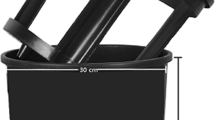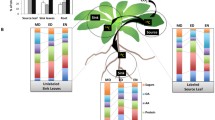Abstract.
To investigate the effect of water stress on carbon metabolism in growing potato tubers (Solanum tuberosum L.), freshly cut and washed discs were incubated in a range of mannitol concentrations corresponding to external water potential between 0 and −1.2 MPa. (i) Incorporation of [14C]glucose into starch was inhibited in water-stressed discs, and labeling of sucrose was increased. High glucose overrode the changes at low water stress (up to −0.5 MPa) but not at high water stress. (ii) Although [14C]sucrose uptake increased in water-stressed discs, less of the absorbed [14C]sucrose was metabolised. (iii) Analysis of the sucrose content of the discs confirmed that increasing water deficit leads to a switch, from net sucrose degradation to net sucrose synthesis. (iv) In parallel incubations containing identical concentrations of sugars but differing in which sugar was labeled, degradation of [14C]sucrose and labeling of sucrose from [14C]glucose and fructose was found at each mannitol concentration. This shows that there is a cycle of sucrose degradation and resynthesis in these tuber discs. Increasing the extent of water stress changed the relation between sucrose breakdown and sucrose synthesis, in favour of synthesis. (v) Analysis of metabolites showed a biphasic response to increasing water deficit. Moderate water stress (0–200 mM mannitol) led to a decrease of the phosphorylated intermediates, especially 3-phosphoglycerate (3PGA). The decrease of metabolites at moderate water stress was not seen when high concentrations of glucose were supplied to the discs. More extreme water stress (300–500 mM mannitol) was accompanied by an accumulation of metabolites at low and high glucose. (vi) Moderate water stress led to an activation of sucrose phosphate synthase (SPS) in discs, and in intact tubers. The stimulation involved a change in the kinetic properties of SPS, and was blocked␣by protein phosphatase inhibitors. (vii) The amount of ADP-glucose (ADPGlc) decreased when discs were incubated on 100 or 200 mM mannitol. There was a strong correlation between the in vivo levels of ADPGlc and 3PGA when discs were subjected to moderate water stress, and when the sugar supply was varied. (viii) The level of ADPGlc increased and starch synthesis was further inhibited when discs were incubated in 300–500 mM mannitol. (ix) It is proposed that moderate water stress leads to an activation of SPS and stimulates sucrose synthesis. The resulting decline of 3PGA leads to a partial inhibition of ADP-glucose pyrophosphorylase and starch synthesis. More-extreme water stress leads to a further alteration of partitioning, because it inhibits the activities of one or more of the enzymes involved in the terminal reactions of starch synthesis.
Similar content being viewed by others
Author information
Authors and Affiliations
Additional information
Received: 26 August 1996 / Accepted: 5 November 1996
Rights and permissions
About this article
Cite this article
Geigenberger, P., Reimholz, R., Geiger, M. et al. Regulation of sucrose and starch metabolism in potato tubers in response to short-term water deficit. Planta 201, 502–518 (1997). https://doi.org/10.1007/s004250050095
Issue Date:
DOI: https://doi.org/10.1007/s004250050095




